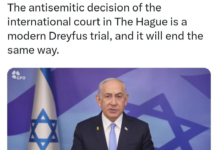The cringeworthy “As British as” campaign launched earlier this week by Muslim charity Penny Appeal was not my cup of tea, writes Dr Mariyam Souissi.
I have never said that I am “British” when someone asks me because I know exactly what the person means when they ask that question.
And even if I was born and raised here, and my family may have lived here for generations, what many are really asking you is: “Why do you look different?” Why, despite being whiter than most, are you not the kind of white or Caucasian the questioner can relate to? Why do your features and genetic stamps bear no resemblance to Britain’s Anglo-Saxon invaders?
See, when people ask this question they don’t care about the colour of your passport. Most of us know this very well, hence why we immediately, or eventually, say we are from Morocco, Pakistan, or some other “exotic” land.
When you do eventually answer, it allows the questioner to put a mental pin on a world map like a scene out of CSI. The questioner can then safely designate all their presupposed stereotypes and attribute it to us.
By knowing this piece of information, the questioner – who tends to have pre-framed racial stereotypes – can categorise us. They can try guessing what we eat and how we think because they once spent a weekend in Marrakesh eating a lamb tagine while watching a snake charmer in a souk, after an exciting day riding a camel and sipping mint tea. They may have even worn a kaftan!
And when the questioner realises their presumptions don’t quite fit, they ask the follow-up question, “so you were born here, right? I can tell…” When you say that you were born here, you half expect a warm welcome as if you had been cordially invited to tea with the Queen. But the truth is, despite this, you are still a foreigner in their land.
Subscribe to our newsletter and stay updated on the latest news and updates from around the Muslim world!
Instead of a welcome, you get the next insult, which is to ask you if you “study or work here”. This is the one time I mention I have a PhD. Of course, many look surprised, probably because they feel I am so privileged to have been educated in this country.
Somehow on their trip to Morocco, while chilling in the riads of Fez, they missed the oldest University in the world, and skipped the class about how seeking knowledge is a foundational concept in Islam.
Perhaps the University seemed less important because the founder was a woman– a Muslim woman – named Fatima, and this goes against the popular belief that Muslim are somehow deprived of education and agency.
It is easy to be sucked into a world of justification and seeking acknowledgement for just how human we are, but when you compare Muslims to a cup of tea, or say that we should “be more charitable” and “more educated” as a way of countering Islamophobia, then you have clearly missed the point.
The discrimination Muslims face in the UK is not because we are “not trying hard enough”, are “not educated enough”, are not reassuringly brown enough – it is because the issue of Islamophobia and racism is systemic, and it influences the psyche of the ordinary folk on a daily basis – both consciously and subconsciously.
“As British as a cup of tea…”
Comparing Muslims to cups of tea is a cringeworthy PR stunt, it’s nearly as sick as victim-blaming or a super milky tea, because really, in the end, it doesn’t matter how “British” you are.
Your success will always be seen as a “favour” bestowed upon you by her Majesty, and your failures will always be seen as inherited baggage from your predecessors. Your mistakes as a Muslim will not be associated with Britain, instead errors are due to your cultural predisposition even if you have never ventured there or are completely unaware of your ethnic origins.
But we should take a step back from this mess. Defining your identity on your own terms outside of the constraints of “acceptability” is quite liberating.
It is high time Muslims stop trying to find the perfect blend of tea. Trying so hard to be palatable to the masses will leave you feeling bitter, so instead, why not find comfort in being an empowered “stranger” defined by the perimeters of Islam?
The Messenger of Allah (peace be upon him) said: “Islam began as something strange and will revert to being strange as it began, so give glad tidings to the strangers.” [Sahih Muslims]
Dr Mariyam Souissi is involved in researching the effects of the counter terrorism apparatus and community empowerment. She has a PhD in scientific research.




















